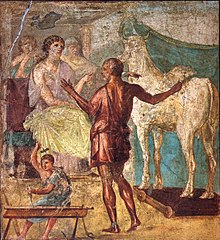Passiphae
In Greek mythology, Pasiphae (in Greek Πασιφάη Pasiphaê, 'the one who shines for all', a name of the Moon) was the daughter of Helios and the nymph Crete (also called Perseis). She was the sister of Circe and Aeetes. She was raised as a princess in Colchis, and then given in marriage to King Minos of Crete.
According to Pausanias, Diodorus Siculus, and Apollodorus, Pasiphae, as the moon goddess, was mother to Minos de Acacalis, Ariadne, Androgeo, Glaucus, Phaedra, and Catreus. With the god Hermes she had Cydon and with the god Zeus the Libyan Amun (the oracular hero of the Oasis of Amun, later equated with Zeus).
Mother of the Minotaur
According to Diodorus Siculus, Pausanias, Virgil, and Apollodorus, the god Poseidon made Pasiphae fall in love with a white bull that, because of its beauty, Minos had not wanted to sacrifice in honor of this god. She entrusted her zoophilic passion to Daedalus, the famous Athenian artificer who lived in exile in Knossos, delighting Minos and his family with the animated wooden dolls she built for them. Daedalus promised to help her and built a hollow wooden cow that she covered with a cowhide. He put hidden wheels under her hooves and took her to the meadow near Gortyna, where Poseidon's bull grazed under the oaks among the cows of Minos. After showing Pasiphae how to open the sliding door on the cow's rear, and helping her get inside with her legs tucked into her hindquarters, he discreetly withdrew. The white bull soon came up and mounted the wooden cow (from which it can be deduced that Daedalus also fastened the wheels to the ground), so that Pasiphae had his wish granted and in due time gave birth to the Minotaur, a creature with head and tail of a bull, but of a human body.
Other versions
Other authors say that Pasiphae had stopped propitiating Aphrodite for several years, who punished her by making her feel that zoophilic desire, or else that the punishment was motivated by Aphrodite's rancor towards Helios and his offspring since he revealed Hephaestus her adultery with Ares, or that the bull Pasiphae fell in love with was actually the animal Zeus had turned into.
Imprisonment in the Labyrinth
According to Apollodorus, Minos consulted an oracle to learn how he could best avoid scandal and hide the dishonor of Pasiphae. The answer was: "Order Daedalus to build you a retreat at Knossos." Daedalus did so and Minos spent the rest of his life in the intricate enclosure called the labyrinth, in the center of which he hid Pasiphae and the Minotaur. In Ovid, on the other hand, only the Minotaur is imprisoned and not Pasiphae. In contrast to other authors, Ovid establishes nine years as the term between the human sacrifices that were made to appease the minotaur.
The infidelities of Minos
According to Apolodoro and Antonino Liberal, the numerous infidelities of King Minos so enraged Pasiphae that she cursed him: every time he had intercourse with another woman, he did not ejaculate semen but harmful snakes, scorpions and centipedes that preyed on him. the vital organs of the lover.
On one occasion, to have relations with the huntress, Procris bribed her by giving her Lelape (a hound that never let its prey escape) and an infallible arrow. Both gifts had been given to him by the goddess Artemis. Procris accepted but she forced him to drink a prophylactic drink—a concoction of magical roots prepared by the sorceress Circe, Pasiphae's sister—so that he would not fill her entrails with vipers and scorpions. The drink had the desired effect, but Procris feared that Pasiphae would bewitch her, so she escaped from Crete.
In Sparta
Pasiphae was worshiped as an oracular goddess in the Laconian city of Thalamas, outside of Sparta. The geographer Pausanias describes the sanctuary as small, situated near a course of clear water, and flanked by bronze statues of Helios and Pasiphae.
His account also equates Pasiphae with Ino and Selene (Leucótea, the 'white goddess', personified by the Moon).
Hera, Pasiphae, and Ino were names of the triple Goddess, the interdependence of whose persons was symbolized by the tripod on which her priestess sat.
Cicero writes in De natura deorum that the Spartan ephors slept in the temple to receive prophetic dreams that would help them rule. According to Plutarch, during the reign of King Agis, various ephors led the people into revolt over oracles at the sanctuary of Pasiphae, which promised forgiveness of debts and redistribution of land.
In one case, an ephor dreamed that the chairs of some of his colleagues were removed from the agora, and that a voice shouted that "this is better for Sparta." Inspired by this, King Cleomenes II acted to consolidate royal power from him.
Contenido relacionado
Villasarracino
Garoe
Surabaya
Vulcan (mythology)
Lucifer

